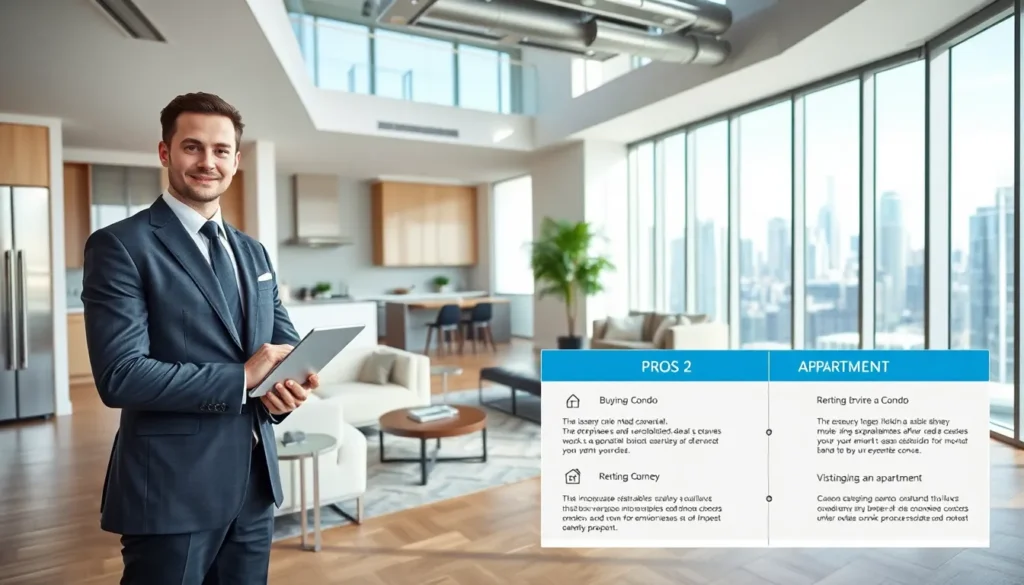Table of Contents
ToggleRenting an apartment can sometimes feel like hunting for the Holy Grail, only to find that it’s buried under layers of paperwork, fees, and more showings than a bad reality TV drama. But don’t panic. With the right guidance, you can navigate this complex process like a pro. This guide is packed with tips that will help you secure an apartment you’ll love, all while keeping your sanity intact. So grab a coffee, settle in, and let’s jump into the nitty-gritty of apartment renting. Spoiler alert: it doesn’t have to be complicated.
Understanding Your Budget

Calculating Rent and Utilities
Before setting forth on your apartment adventure, it’s crucial to grasp your budget. Rent is often just the tip of the iceberg, with utilities lurking underneath, ready to surprise you. Start by determining how much you can comfortably spend on rent each month, typically around 30% of your income is a golden rule. Don’t forget utilities, electric, water, gas, internet, those sneaky expenses add up quickly.
Additional Costs to Consider
Beyond the basics, consider other costs that may arise. Application fees, security deposits, and pet fees (if you have furry friends) should be factored into your financial calculations. Insurance for renters can also be a smart move: having this coverage protects your belongings should disaster strike. Taking all of this into account allows for a more accurate budget and avoids potential pitfalls later.
Setting a Realistic Budget
Creating a realistic budget is your ticket to stress-free apartment hunting. Don’t just think about what you can afford today: consider your future as well. Will your job situation change? Will you have to juggle student loans or other expenses? Crafting a budget that accounts for both your present and future situation ensures you won’t be left scrambling in a few months.
Researching Apartment Listings
Choosing the Right Location
Location, location, location. This mantra is not just hype: it’s the essence of apartment hunting. You want to be close to your work, dining, public transport, and, of course, any nightlife that piques your interest. Research neighborhoods thoroughly and look for amenities that suit your lifestyle.
Utilizing Online Resources
In this digital age, apartment hunting has never been easier. Platforms like Zillow, Apartments.com, and local Craigslist listings can provide an extensive view of available rentals. Use filters to hone in on your preferences, price, location, and pet policies. Social media also proves valuable: sometimes, current tenants share listings on community groups.
Visiting Properties in Person
Conducting Thorough Inspections
Once you’ve narrowed down a few choices, it’s time to visit. Seeing a property in person can be enlightening, and it gives you the chance to check for any hidden issues. Walk through every room, ensure appliances are functioning, and don’t shy away from checking storage spaces or closets.
Asking the Right Questions
Come prepared with questions to ask the landlord or property manager. Inquire about maintenance protocols, parking availability, and any neighborhood issues they’re aware of. A landlord who is open and communicative can significantly enhance your rental experience.
Negotiating Lease Terms
Understanding Lease Agreements
Once you find the perfect place, the next step is to investigate into the lease agreement. Knowing what to look for is critical: ensure it’s clear on rent, duration, and renewal terms. Understanding your lease can save you from future heartache and provides insight into what your responsibilities are as a tenant.
Important Clauses to Look For
Pay close attention to clauses about security deposits and lease breaking. Some leases have strict policies on subletting or guests, which can complicate your living situation later. Make sure you know what your lease entails to avoid any later surprises.
Finalizing the Rental Agreement
Preparing for the Move-In Process
With the lease signed, it’s finally time to get your keys. Prepare for the move-in process. Ensure you set a date with your landlord for when you can start moving your stuff in, and double-check if you need to pay the first month’s rent or deposit as well.
Organizing Your Move
Take some stress out of moving by organizing early. Create a moving checklist for everything from packing supplies to scheduling movers. The earlier you start, the smoother your transition will be.
Maintaining a Positive Relationship with Your Landlord
Communicating Effectively
Building a good relationship with your landlord can elevate your rental experience. Keep communication channels open, whether it’s a simple thank-you for a quick fix or raising concerns, maintaining a friendly rapport makes taps into your landlord’s goodwill. A responsive landlord is often willing to accommodate reasonable requests and help with maintenance.




